MGT723 Research: Stakeholder Theory Facilitating Carbon Disclosure
VerifiedAdded on 2023/06/13
|11
|1730
|199
Report
AI Summary
This research proposal explores how stakeholder theory can facilitate addressing carbon disclosure concerns in companies. It reviews the practical and theoretical motivations for carbon disclosure, previous research findings, and key concepts of stakeholder theory. The proposal presents a conceptual framework model illustrating the relationship between slack, information asymmetry, and carbon disclosure. It formulates hypotheses related to the relationship between disclosure and company profitability, target slack, and performance-based incentives. The research method involves primary and secondary data collection, including interviews with managers, and data analysis using MS Excel for correlation and regression analysis. This document is available on Desklib, where students can find a wealth of academic resources, including past papers and solved assignments.
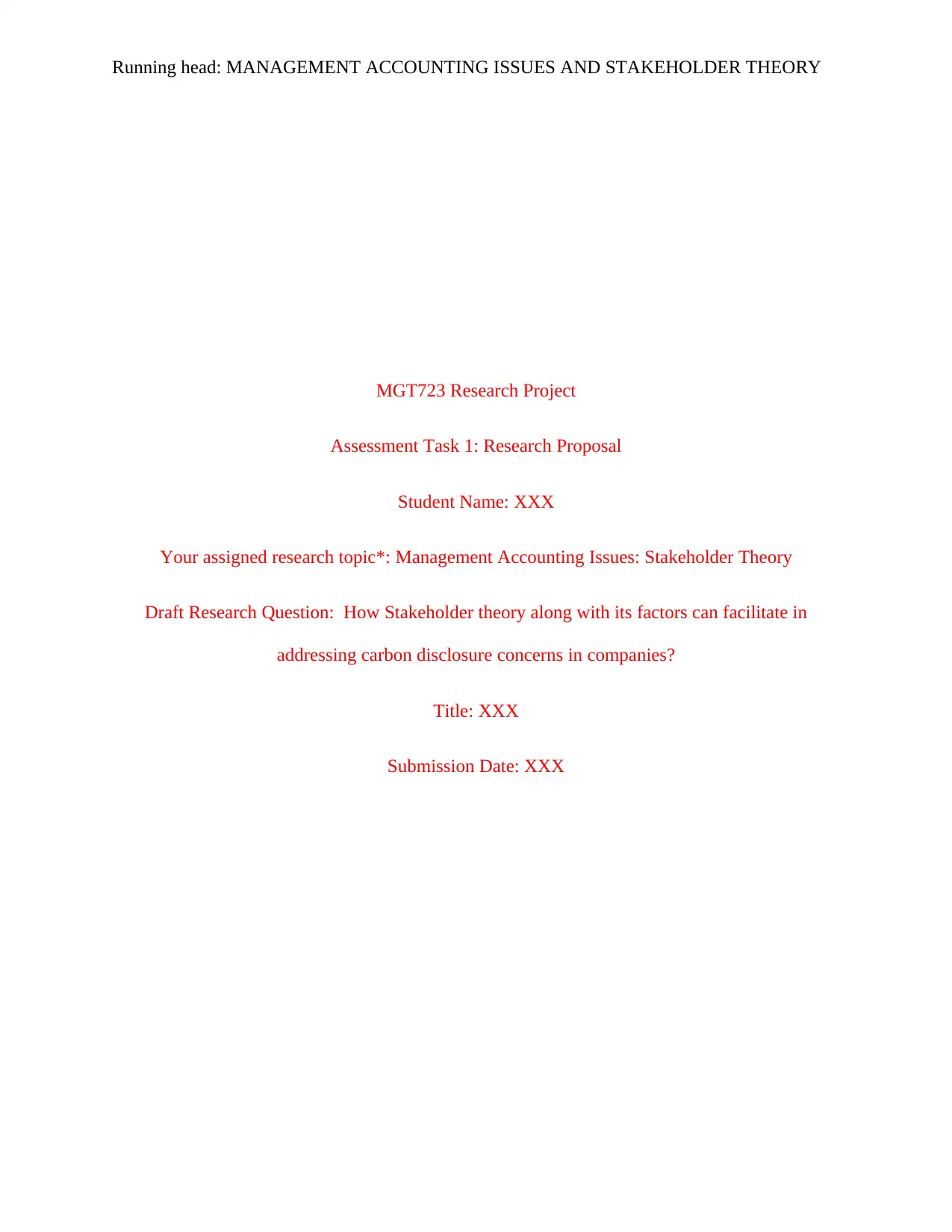
Running head: MANAGEMENT ACCOUNTING ISSUES AND STAKEHOLDER THEORY
MGT723 Research Project
Assessment Task 1: Research Proposal
Student Name: XXX
Your assigned research topic*: Management Accounting Issues: Stakeholder Theory
Draft Research Question: How Stakeholder theory along with its factors can facilitate in
addressing carbon disclosure concerns in companies?
Title: XXX
Submission Date: XXX
MGT723 Research Project
Assessment Task 1: Research Proposal
Student Name: XXX
Your assigned research topic*: Management Accounting Issues: Stakeholder Theory
Draft Research Question: How Stakeholder theory along with its factors can facilitate in
addressing carbon disclosure concerns in companies?
Title: XXX
Submission Date: XXX
Paraphrase This Document
Need a fresh take? Get an instant paraphrase of this document with our AI Paraphraser
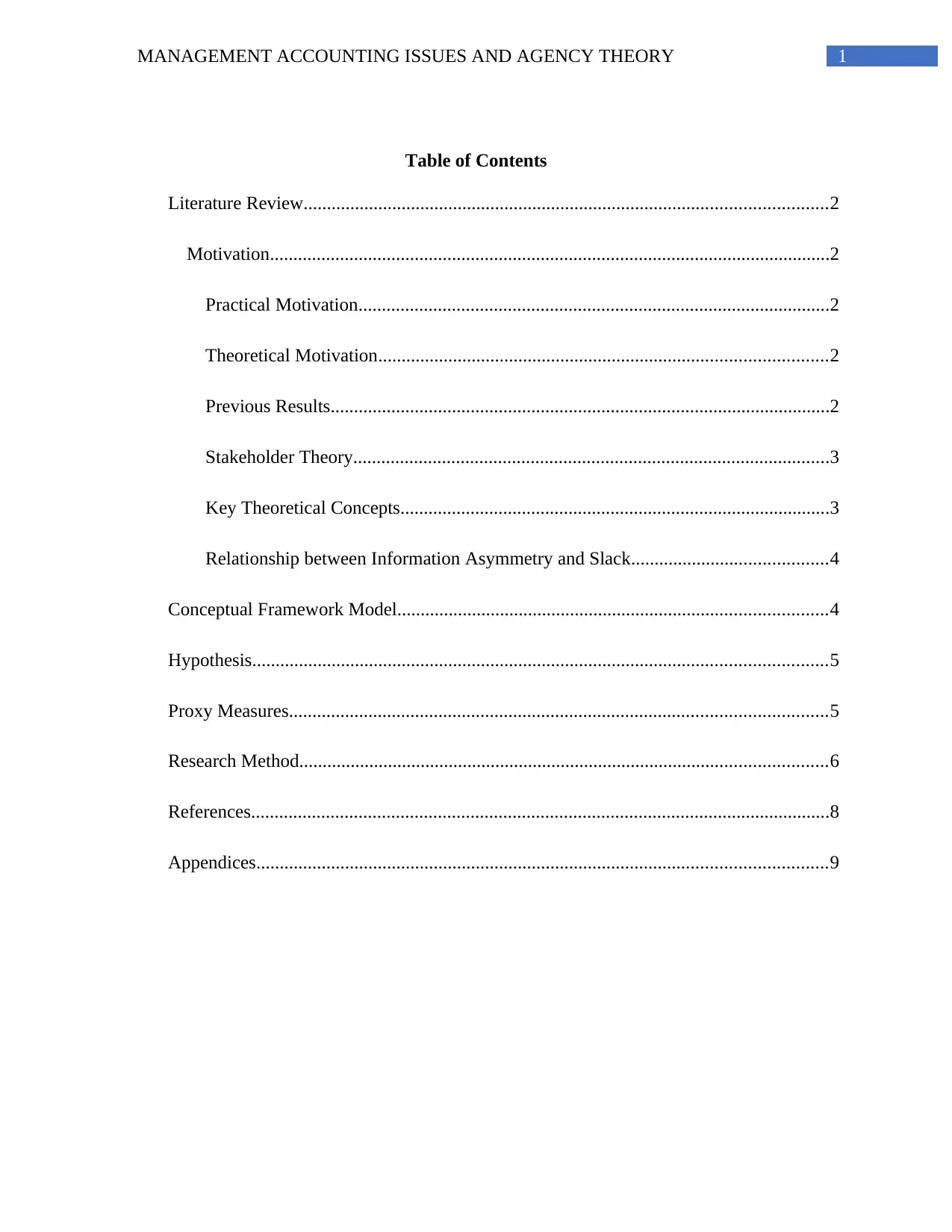
1MANAGEMENT ACCOUNTING ISSUES AND AGENCY THEORY
Table of Contents
Literature Review................................................................................................................2
Motivation........................................................................................................................2
Practical Motivation.....................................................................................................2
Theoretical Motivation................................................................................................2
Previous Results...........................................................................................................2
Stakeholder Theory......................................................................................................3
Key Theoretical Concepts............................................................................................3
Relationship between Information Asymmetry and Slack..........................................4
Conceptual Framework Model............................................................................................4
Hypothesis...........................................................................................................................5
Proxy Measures...................................................................................................................5
Research Method.................................................................................................................6
References............................................................................................................................8
Appendices..........................................................................................................................9
Table of Contents
Literature Review................................................................................................................2
Motivation........................................................................................................................2
Practical Motivation.....................................................................................................2
Theoretical Motivation................................................................................................2
Previous Results...........................................................................................................2
Stakeholder Theory......................................................................................................3
Key Theoretical Concepts............................................................................................3
Relationship between Information Asymmetry and Slack..........................................4
Conceptual Framework Model............................................................................................4
Hypothesis...........................................................................................................................5
Proxy Measures...................................................................................................................5
Research Method.................................................................................................................6
References............................................................................................................................8
Appendices..........................................................................................................................9
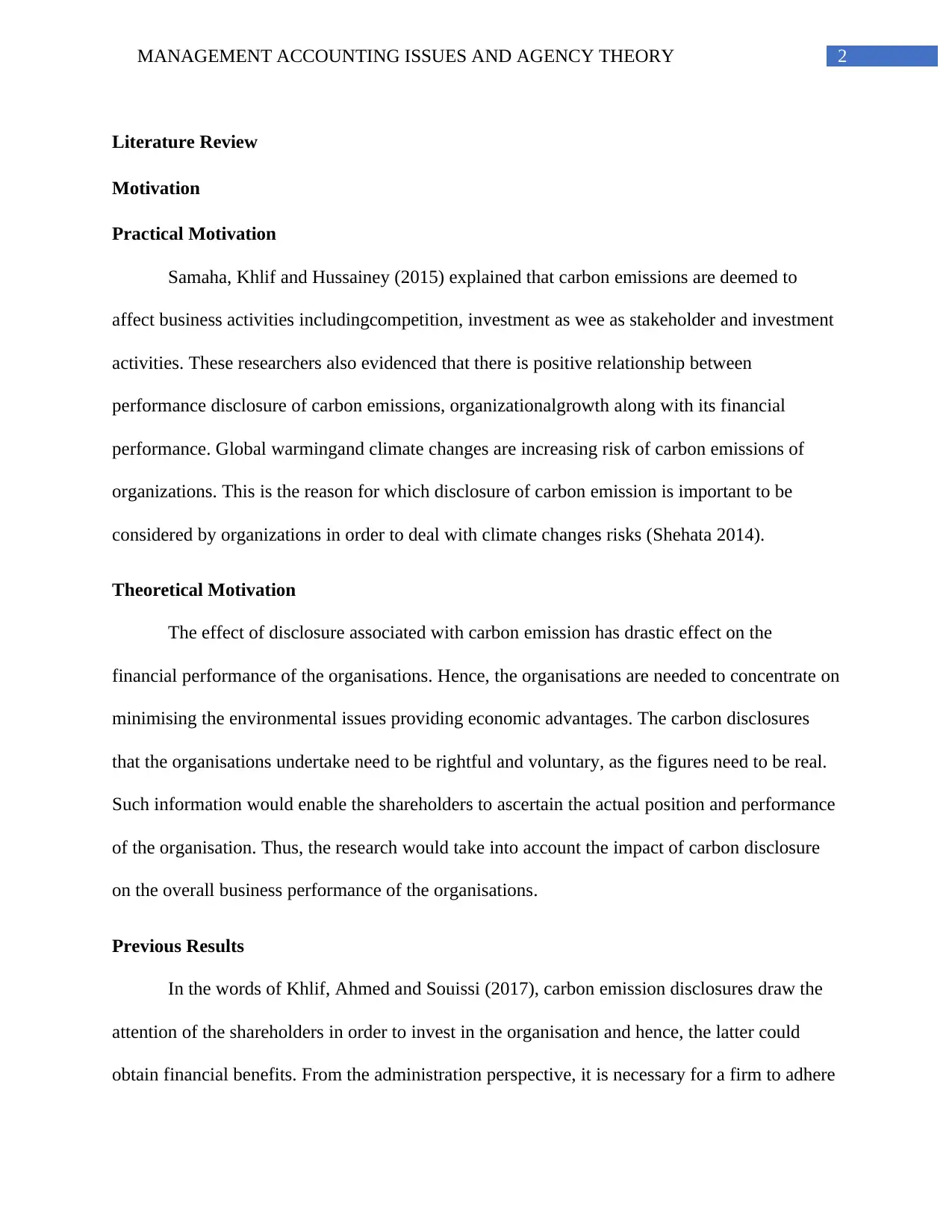
2MANAGEMENT ACCOUNTING ISSUES AND AGENCY THEORY
Literature Review
Motivation
Practical Motivation
Samaha, Khlif and Hussainey (2015) explained that carbon emissions are deemed to
affect business activities includingcompetition, investment as wee as stakeholder and investment
activities. These researchers also evidenced that there is positive relationship between
performance disclosure of carbon emissions, organizationalgrowth along with its financial
performance. Global warmingand climate changes are increasing risk of carbon emissions of
organizations. This is the reason for which disclosure of carbon emission is important to be
considered by organizations in order to deal with climate changes risks (Shehata 2014).
Theoretical Motivation
The effect of disclosure associated with carbon emission has drastic effect on the
financial performance of the organisations. Hence, the organisations are needed to concentrate on
minimising the environmental issues providing economic advantages. The carbon disclosures
that the organisations undertake need to be rightful and voluntary, as the figures need to be real.
Such information would enable the shareholders to ascertain the actual position and performance
of the organisation. Thus, the research would take into account the impact of carbon disclosure
on the overall business performance of the organisations.
Previous Results
In the words of Khlif, Ahmed and Souissi (2017), carbon emission disclosures draw the
attention of the shareholders in order to invest in the organisation and hence, the latter could
obtain financial benefits. From the administration perspective, it is necessary for a firm to adhere
Literature Review
Motivation
Practical Motivation
Samaha, Khlif and Hussainey (2015) explained that carbon emissions are deemed to
affect business activities includingcompetition, investment as wee as stakeholder and investment
activities. These researchers also evidenced that there is positive relationship between
performance disclosure of carbon emissions, organizationalgrowth along with its financial
performance. Global warmingand climate changes are increasing risk of carbon emissions of
organizations. This is the reason for which disclosure of carbon emission is important to be
considered by organizations in order to deal with climate changes risks (Shehata 2014).
Theoretical Motivation
The effect of disclosure associated with carbon emission has drastic effect on the
financial performance of the organisations. Hence, the organisations are needed to concentrate on
minimising the environmental issues providing economic advantages. The carbon disclosures
that the organisations undertake need to be rightful and voluntary, as the figures need to be real.
Such information would enable the shareholders to ascertain the actual position and performance
of the organisation. Thus, the research would take into account the impact of carbon disclosure
on the overall business performance of the organisations.
Previous Results
In the words of Khlif, Ahmed and Souissi (2017), carbon emission disclosures draw the
attention of the shareholders in order to invest in the organisation and hence, the latter could
obtain financial benefits. From the administration perspective, it is necessary for a firm to adhere
⊘ This is a preview!⊘
Do you want full access?
Subscribe today to unlock all pages.

Trusted by 1+ million students worldwide
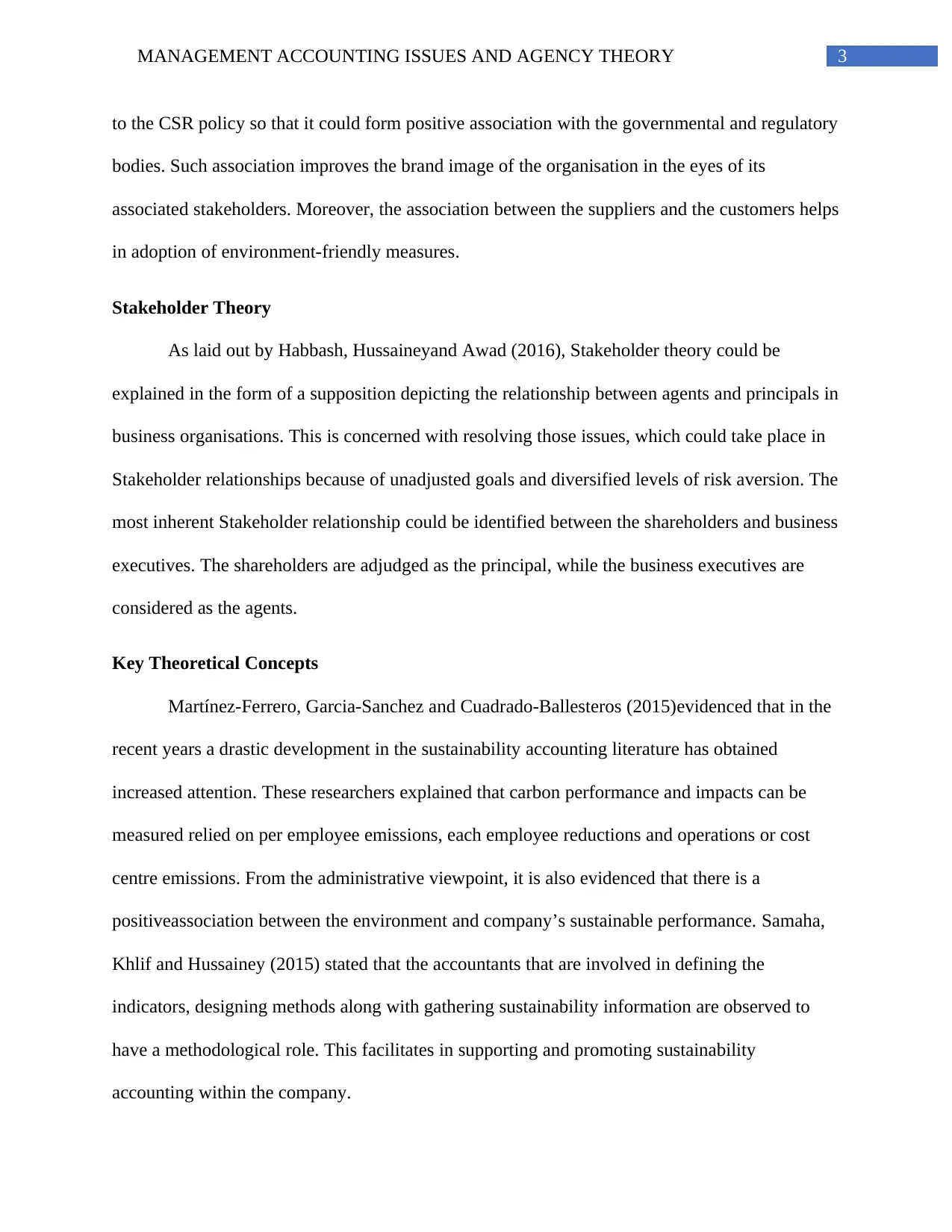
3MANAGEMENT ACCOUNTING ISSUES AND AGENCY THEORY
to the CSR policy so that it could form positive association with the governmental and regulatory
bodies. Such association improves the brand image of the organisation in the eyes of its
associated stakeholders. Moreover, the association between the suppliers and the customers helps
in adoption of environment-friendly measures.
Stakeholder Theory
As laid out by Habbash, Hussaineyand Awad (2016), Stakeholder theory could be
explained in the form of a supposition depicting the relationship between agents and principals in
business organisations. This is concerned with resolving those issues, which could take place in
Stakeholder relationships because of unadjusted goals and diversified levels of risk aversion. The
most inherent Stakeholder relationship could be identified between the shareholders and business
executives. The shareholders are adjudged as the principal, while the business executives are
considered as the agents.
Key Theoretical Concepts
Martínez‐Ferrero, Garcia‐Sanchez and Cuadrado‐Ballesteros (2015)evidenced that in the
recent years a drastic development in the sustainability accounting literature has obtained
increased attention. These researchers explained that carbon performance and impacts can be
measured relied on per employee emissions, each employee reductions and operations or cost
centre emissions. From the administrative viewpoint, it is also evidenced that there is a
positiveassociation between the environment and company’s sustainable performance. Samaha,
Khlif and Hussainey (2015) stated that the accountants that are involved in defining the
indicators, designing methods along with gathering sustainability information are observed to
have a methodological role. This facilitates in supporting and promoting sustainability
accounting within the company.
to the CSR policy so that it could form positive association with the governmental and regulatory
bodies. Such association improves the brand image of the organisation in the eyes of its
associated stakeholders. Moreover, the association between the suppliers and the customers helps
in adoption of environment-friendly measures.
Stakeholder Theory
As laid out by Habbash, Hussaineyand Awad (2016), Stakeholder theory could be
explained in the form of a supposition depicting the relationship between agents and principals in
business organisations. This is concerned with resolving those issues, which could take place in
Stakeholder relationships because of unadjusted goals and diversified levels of risk aversion. The
most inherent Stakeholder relationship could be identified between the shareholders and business
executives. The shareholders are adjudged as the principal, while the business executives are
considered as the agents.
Key Theoretical Concepts
Martínez‐Ferrero, Garcia‐Sanchez and Cuadrado‐Ballesteros (2015)evidenced that in the
recent years a drastic development in the sustainability accounting literature has obtained
increased attention. These researchers explained that carbon performance and impacts can be
measured relied on per employee emissions, each employee reductions and operations or cost
centre emissions. From the administrative viewpoint, it is also evidenced that there is a
positiveassociation between the environment and company’s sustainable performance. Samaha,
Khlif and Hussainey (2015) stated that the accountants that are involved in defining the
indicators, designing methods along with gathering sustainability information are observed to
have a methodological role. This facilitates in supporting and promoting sustainability
accounting within the company.
Paraphrase This Document
Need a fresh take? Get an instant paraphrase of this document with our AI Paraphraser
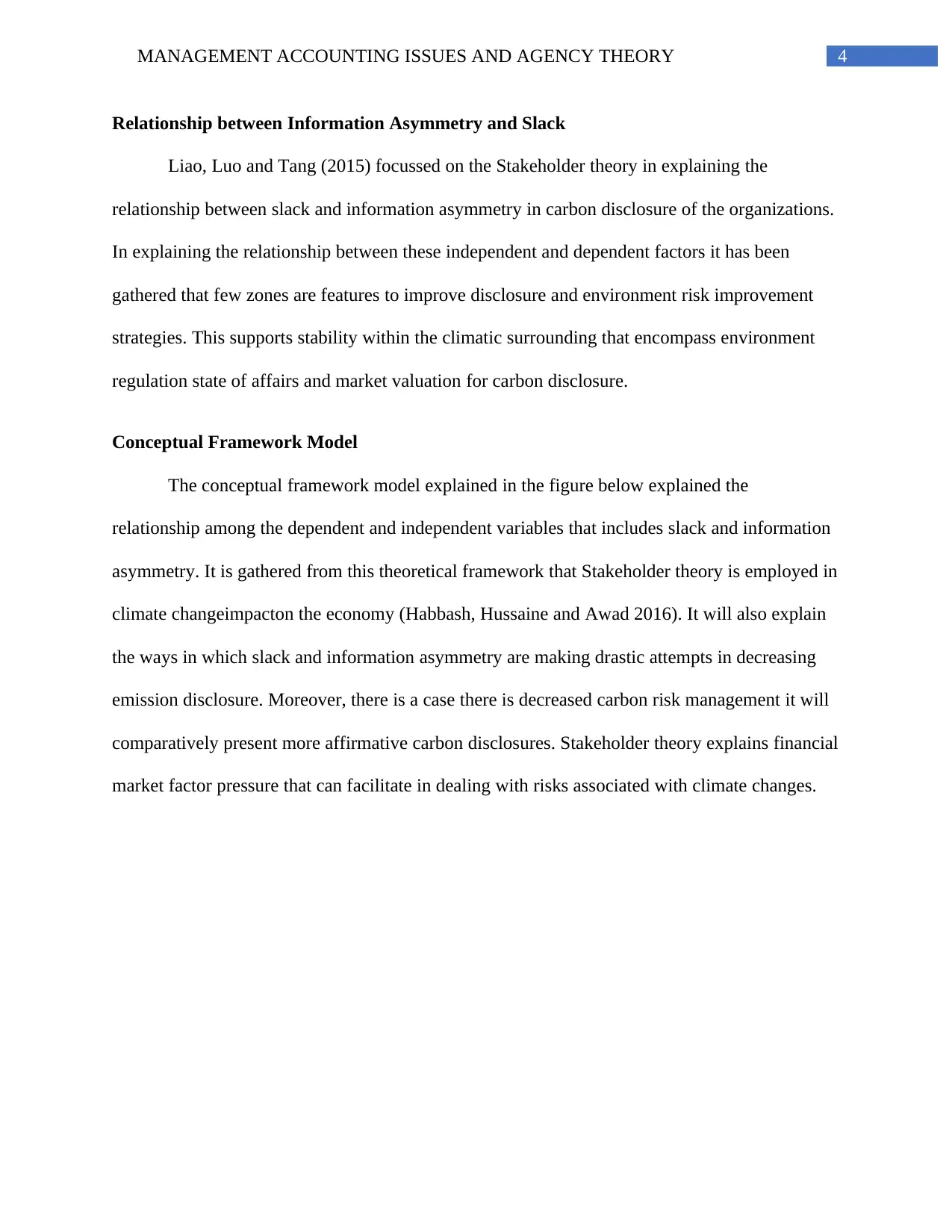
4MANAGEMENT ACCOUNTING ISSUES AND AGENCY THEORY
Relationship between Information Asymmetry and Slack
Liao, Luo and Tang (2015) focussed on the Stakeholder theory in explaining the
relationship between slack and information asymmetry in carbon disclosure of the organizations.
In explaining the relationship between these independent and dependent factors it has been
gathered that few zones are features to improve disclosure and environment risk improvement
strategies. This supports stability within the climatic surrounding that encompass environment
regulation state of affairs and market valuation for carbon disclosure.
Conceptual Framework Model
The conceptual framework model explained in the figure below explained the
relationship among the dependent and independent variables that includes slack and information
asymmetry. It is gathered from this theoretical framework that Stakeholder theory is employed in
climate changeimpacton the economy (Habbash, Hussaine and Awad 2016). It will also explain
the ways in which slack and information asymmetry are making drastic attempts in decreasing
emission disclosure. Moreover, there is a case there is decreased carbon risk management it will
comparatively present more affirmative carbon disclosures. Stakeholder theory explains financial
market factor pressure that can facilitate in dealing with risks associated with climate changes.
Relationship between Information Asymmetry and Slack
Liao, Luo and Tang (2015) focussed on the Stakeholder theory in explaining the
relationship between slack and information asymmetry in carbon disclosure of the organizations.
In explaining the relationship between these independent and dependent factors it has been
gathered that few zones are features to improve disclosure and environment risk improvement
strategies. This supports stability within the climatic surrounding that encompass environment
regulation state of affairs and market valuation for carbon disclosure.
Conceptual Framework Model
The conceptual framework model explained in the figure below explained the
relationship among the dependent and independent variables that includes slack and information
asymmetry. It is gathered from this theoretical framework that Stakeholder theory is employed in
climate changeimpacton the economy (Habbash, Hussaine and Awad 2016). It will also explain
the ways in which slack and information asymmetry are making drastic attempts in decreasing
emission disclosure. Moreover, there is a case there is decreased carbon risk management it will
comparatively present more affirmative carbon disclosures. Stakeholder theory explains financial
market factor pressure that can facilitate in dealing with risks associated with climate changes.
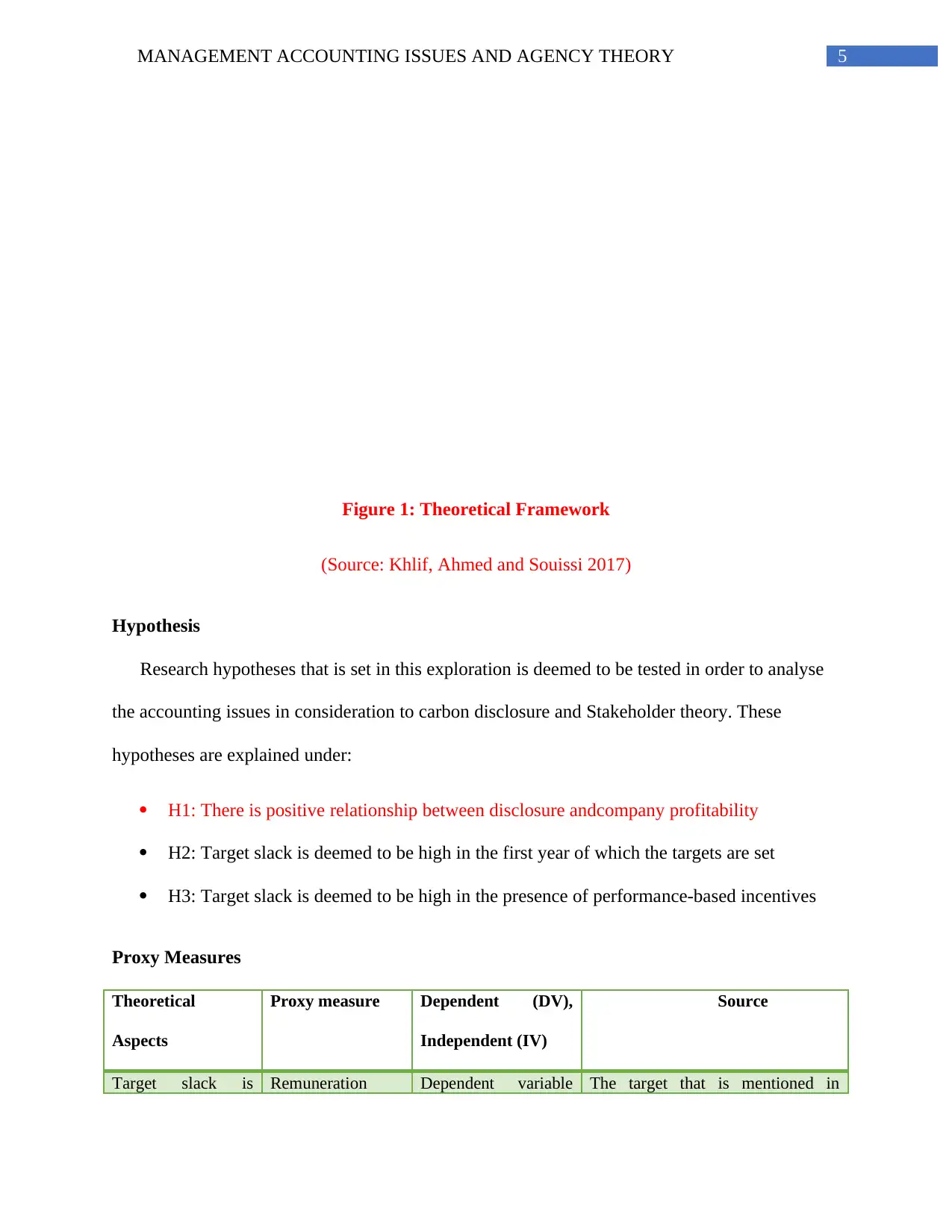
5MANAGEMENT ACCOUNTING ISSUES AND AGENCY THEORY
Figure 1: Theoretical Framework
(Source: Khlif, Ahmed and Souissi 2017)
Hypothesis
Research hypotheses that is set in this exploration is deemed to be tested in order to analyse
the accounting issues in consideration to carbon disclosure and Stakeholder theory. These
hypotheses are explained under:
H1: There is positive relationship between disclosure andcompany profitability
H2: Target slack is deemed to be high in the first year of which the targets are set
H3: Target slack is deemed to be high in the presence of performance-based incentives
Proxy Measures
Theoretical
Aspects
Proxy measure Dependent (DV),
Independent (IV)
Source
Target slack is Remuneration Dependent variable The target that is mentioned in
Slack
Figure 1: Theoretical Framework
(Source: Khlif, Ahmed and Souissi 2017)
Hypothesis
Research hypotheses that is set in this exploration is deemed to be tested in order to analyse
the accounting issues in consideration to carbon disclosure and Stakeholder theory. These
hypotheses are explained under:
H1: There is positive relationship between disclosure andcompany profitability
H2: Target slack is deemed to be high in the first year of which the targets are set
H3: Target slack is deemed to be high in the presence of performance-based incentives
Proxy Measures
Theoretical
Aspects
Proxy measure Dependent (DV),
Independent (IV)
Source
Target slack is Remuneration Dependent variable The target that is mentioned in
Slack
⊘ This is a preview!⊘
Do you want full access?
Subscribe today to unlock all pages.

Trusted by 1+ million students worldwide
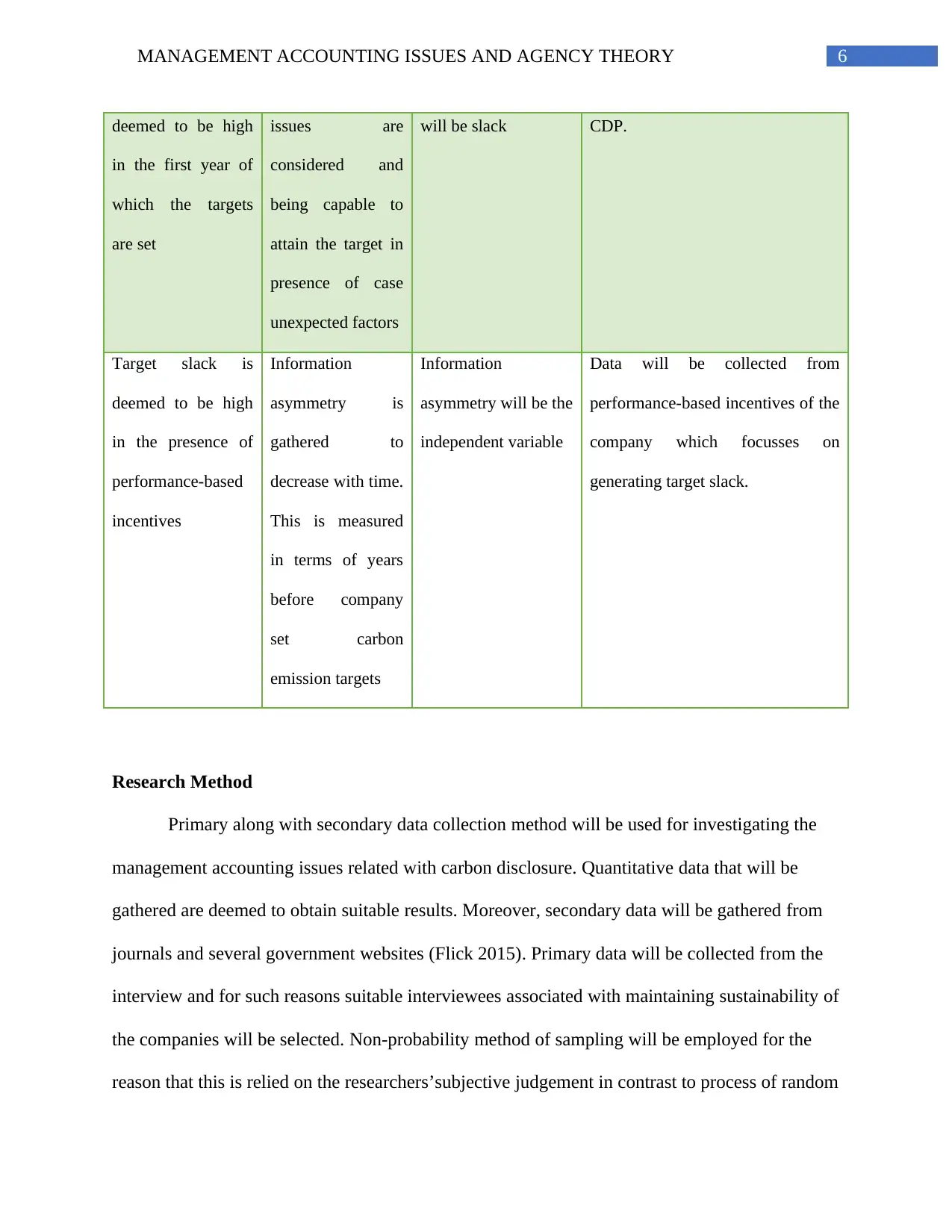
6MANAGEMENT ACCOUNTING ISSUES AND AGENCY THEORY
deemed to be high
in the first year of
which the targets
are set
issues are
considered and
being capable to
attain the target in
presence of case
unexpected factors
will be slack CDP.
Target slack is
deemed to be high
in the presence of
performance-based
incentives
Information
asymmetry is
gathered to
decrease with time.
This is measured
in terms of years
before company
set carbon
emission targets
Information
asymmetry will be the
independent variable
Data will be collected from
performance-based incentives of the
company which focusses on
generating target slack.
Research Method
Primary along with secondary data collection method will be used for investigating the
management accounting issues related with carbon disclosure. Quantitative data that will be
gathered are deemed to obtain suitable results. Moreover, secondary data will be gathered from
journals and several government websites (Flick 2015). Primary data will be collected from the
interview and for such reasons suitable interviewees associated with maintaining sustainability of
the companies will be selected. Non-probability method of sampling will be employed for the
reason that this is relied on the researchers’subjective judgement in contrast to process of random
deemed to be high
in the first year of
which the targets
are set
issues are
considered and
being capable to
attain the target in
presence of case
unexpected factors
will be slack CDP.
Target slack is
deemed to be high
in the presence of
performance-based
incentives
Information
asymmetry is
gathered to
decrease with time.
This is measured
in terms of years
before company
set carbon
emission targets
Information
asymmetry will be the
independent variable
Data will be collected from
performance-based incentives of the
company which focusses on
generating target slack.
Research Method
Primary along with secondary data collection method will be used for investigating the
management accounting issues related with carbon disclosure. Quantitative data that will be
gathered are deemed to obtain suitable results. Moreover, secondary data will be gathered from
journals and several government websites (Flick 2015). Primary data will be collected from the
interview and for such reasons suitable interviewees associated with maintaining sustainability of
the companies will be selected. Non-probability method of sampling will be employed for the
reason that this is relied on the researchers’subjective judgement in contrast to process of random
Paraphrase This Document
Need a fresh take? Get an instant paraphrase of this document with our AI Paraphraser
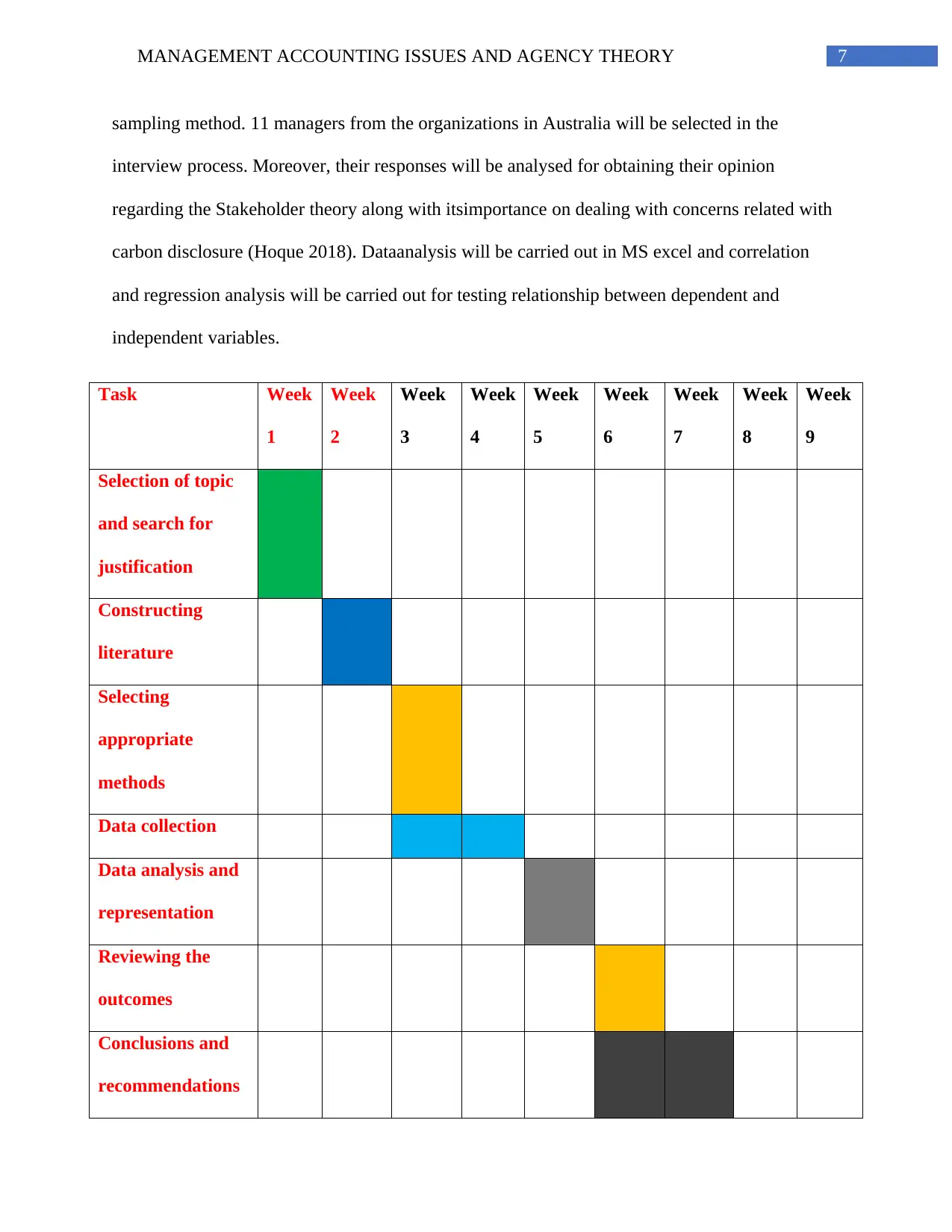
7MANAGEMENT ACCOUNTING ISSUES AND AGENCY THEORY
sampling method. 11 managers from the organizations in Australia will be selected in the
interview process. Moreover, their responses will be analysed for obtaining their opinion
regarding the Stakeholder theory along with itsimportance on dealing with concerns related with
carbon disclosure (Hoque 2018). Dataanalysis will be carried out in MS excel and correlation
and regression analysis will be carried out for testing relationship between dependent and
independent variables.
Task Week
1
Week
2
Week
3
Week
4
Week
5
Week
6
Week
7
Week
8
Week
9
Selection of topic
and search for
justification
Constructing
literature
Selecting
appropriate
methods
Data collection
Data analysis and
representation
Reviewing the
outcomes
Conclusions and
recommendations
sampling method. 11 managers from the organizations in Australia will be selected in the
interview process. Moreover, their responses will be analysed for obtaining their opinion
regarding the Stakeholder theory along with itsimportance on dealing with concerns related with
carbon disclosure (Hoque 2018). Dataanalysis will be carried out in MS excel and correlation
and regression analysis will be carried out for testing relationship between dependent and
independent variables.
Task Week
1
Week
2
Week
3
Week
4
Week
5
Week
6
Week
7
Week
8
Week
9
Selection of topic
and search for
justification
Constructing
literature
Selecting
appropriate
methods
Data collection
Data analysis and
representation
Reviewing the
outcomes
Conclusions and
recommendations
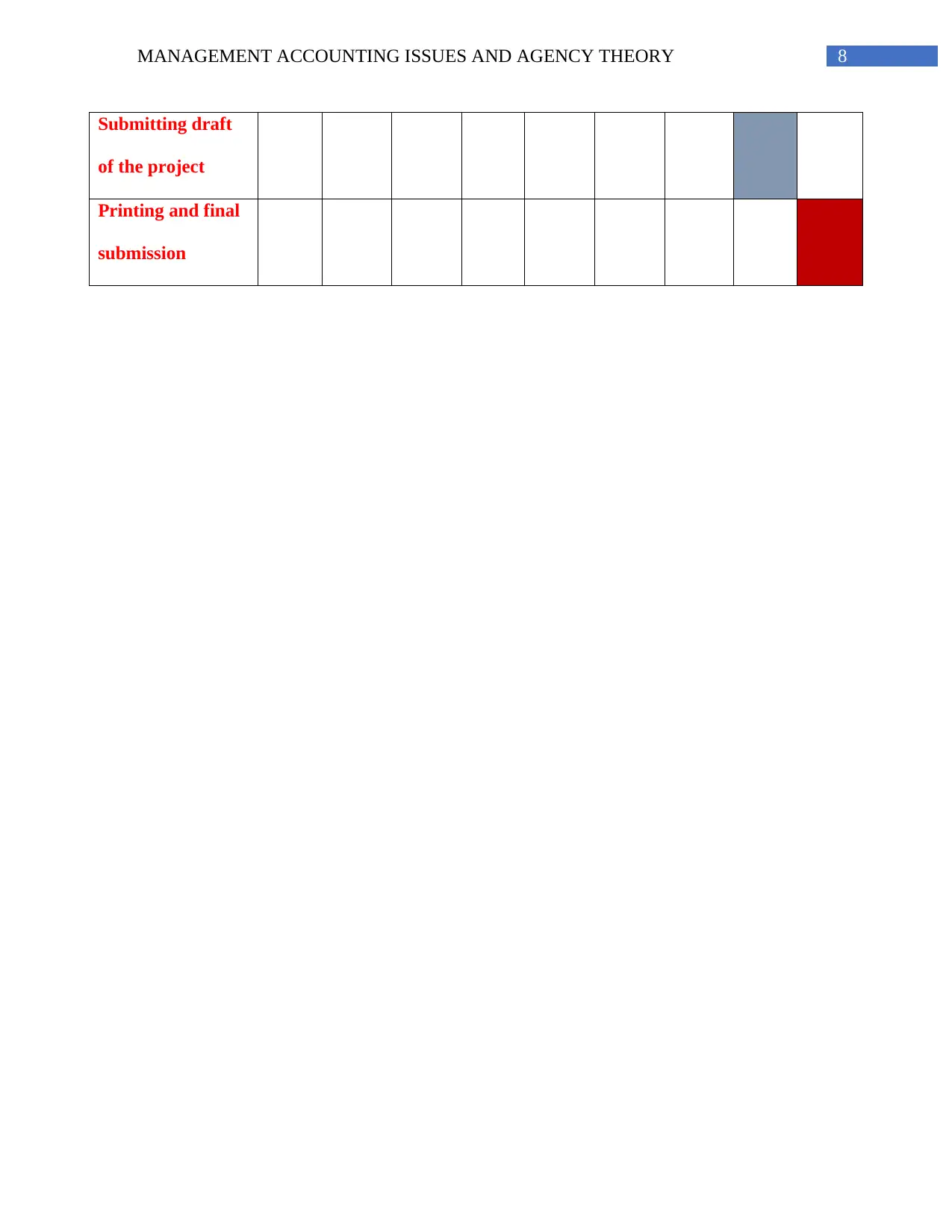
8MANAGEMENT ACCOUNTING ISSUES AND AGENCY THEORY
Submitting draft
of the project
Printing and final
submission
Submitting draft
of the project
Printing and final
submission
⊘ This is a preview!⊘
Do you want full access?
Subscribe today to unlock all pages.

Trusted by 1+ million students worldwide
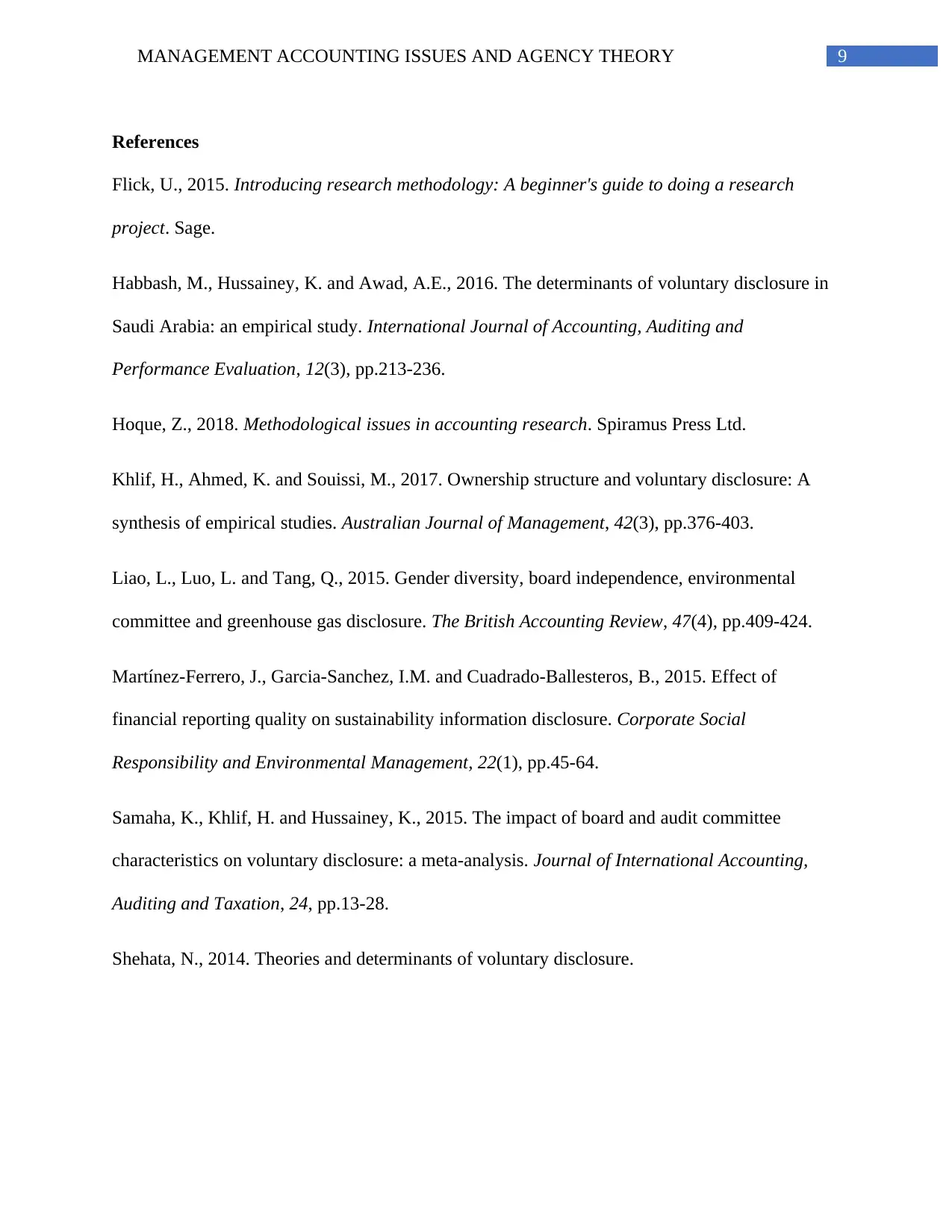
9MANAGEMENT ACCOUNTING ISSUES AND AGENCY THEORY
References
Flick, U., 2015. Introducing research methodology: A beginner's guide to doing a research
project. Sage.
Habbash, M., Hussainey, K. and Awad, A.E., 2016. The determinants of voluntary disclosure in
Saudi Arabia: an empirical study. International Journal of Accounting, Auditing and
Performance Evaluation, 12(3), pp.213-236.
Hoque, Z., 2018. Methodological issues in accounting research. Spiramus Press Ltd.
Khlif, H., Ahmed, K. and Souissi, M., 2017. Ownership structure and voluntary disclosure: A
synthesis of empirical studies. Australian Journal of Management, 42(3), pp.376-403.
Liao, L., Luo, L. and Tang, Q., 2015. Gender diversity, board independence, environmental
committee and greenhouse gas disclosure. The British Accounting Review, 47(4), pp.409-424.
Martínez‐Ferrero, J., Garcia‐Sanchez, I.M. and Cuadrado‐Ballesteros, B., 2015. Effect of
financial reporting quality on sustainability information disclosure. Corporate Social
Responsibility and Environmental Management, 22(1), pp.45-64.
Samaha, K., Khlif, H. and Hussainey, K., 2015. The impact of board and audit committee
characteristics on voluntary disclosure: a meta-analysis. Journal of International Accounting,
Auditing and Taxation, 24, pp.13-28.
Shehata, N., 2014. Theories and determinants of voluntary disclosure.
References
Flick, U., 2015. Introducing research methodology: A beginner's guide to doing a research
project. Sage.
Habbash, M., Hussainey, K. and Awad, A.E., 2016. The determinants of voluntary disclosure in
Saudi Arabia: an empirical study. International Journal of Accounting, Auditing and
Performance Evaluation, 12(3), pp.213-236.
Hoque, Z., 2018. Methodological issues in accounting research. Spiramus Press Ltd.
Khlif, H., Ahmed, K. and Souissi, M., 2017. Ownership structure and voluntary disclosure: A
synthesis of empirical studies. Australian Journal of Management, 42(3), pp.376-403.
Liao, L., Luo, L. and Tang, Q., 2015. Gender diversity, board independence, environmental
committee and greenhouse gas disclosure. The British Accounting Review, 47(4), pp.409-424.
Martínez‐Ferrero, J., Garcia‐Sanchez, I.M. and Cuadrado‐Ballesteros, B., 2015. Effect of
financial reporting quality on sustainability information disclosure. Corporate Social
Responsibility and Environmental Management, 22(1), pp.45-64.
Samaha, K., Khlif, H. and Hussainey, K., 2015. The impact of board and audit committee
characteristics on voluntary disclosure: a meta-analysis. Journal of International Accounting,
Auditing and Taxation, 24, pp.13-28.
Shehata, N., 2014. Theories and determinants of voluntary disclosure.
Paraphrase This Document
Need a fresh take? Get an instant paraphrase of this document with our AI Paraphraser
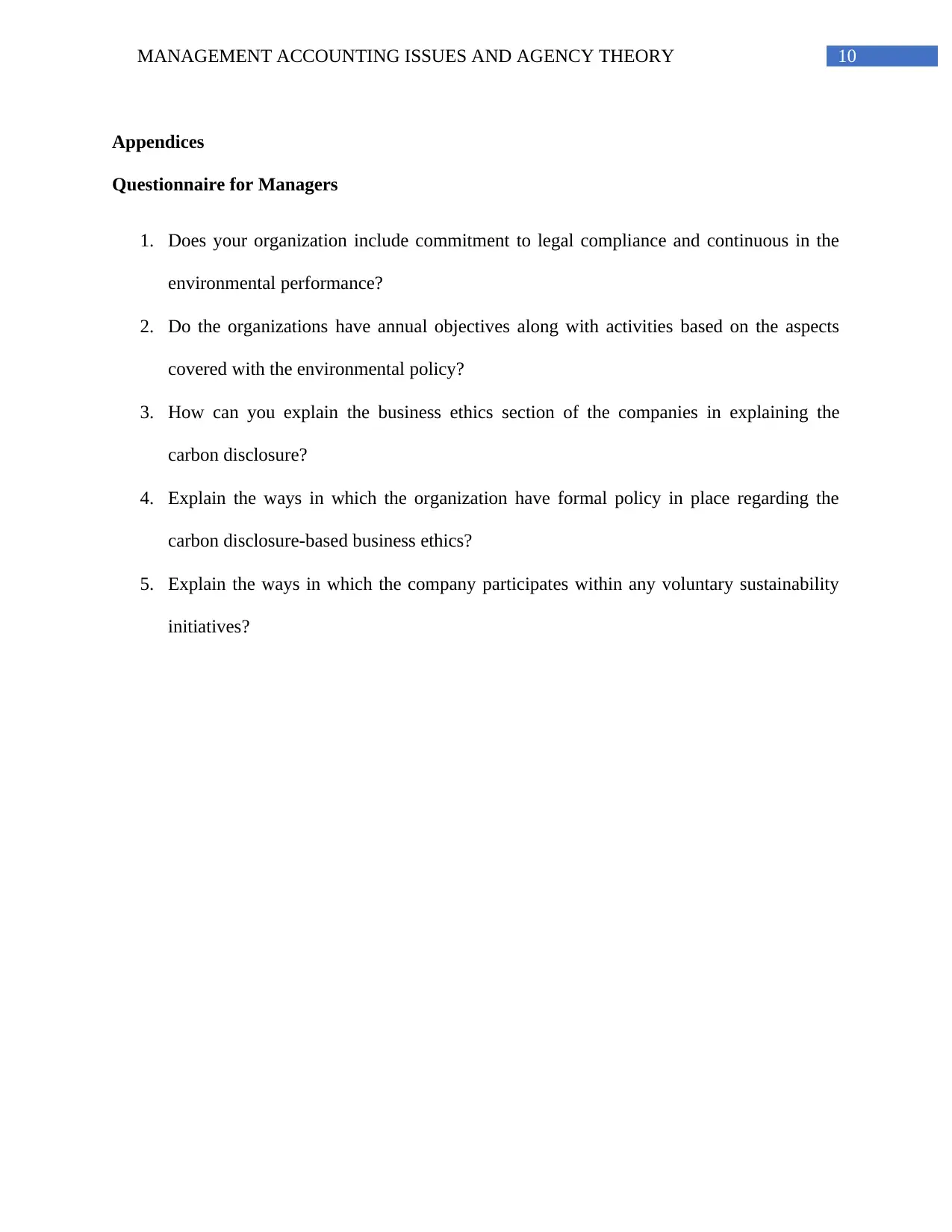
10MANAGEMENT ACCOUNTING ISSUES AND AGENCY THEORY
Appendices
Questionnaire for Managers
1. Does your organization include commitment to legal compliance and continuous in the
environmental performance?
2. Do the organizations have annual objectives along with activities based on the aspects
covered with the environmental policy?
3. How can you explain the business ethics section of the companies in explaining the
carbon disclosure?
4. Explain the ways in which the organization have formal policy in place regarding the
carbon disclosure-based business ethics?
5. Explain the ways in which the company participates within any voluntary sustainability
initiatives?
Appendices
Questionnaire for Managers
1. Does your organization include commitment to legal compliance and continuous in the
environmental performance?
2. Do the organizations have annual objectives along with activities based on the aspects
covered with the environmental policy?
3. How can you explain the business ethics section of the companies in explaining the
carbon disclosure?
4. Explain the ways in which the organization have formal policy in place regarding the
carbon disclosure-based business ethics?
5. Explain the ways in which the company participates within any voluntary sustainability
initiatives?
1 out of 11
Related Documents
Your All-in-One AI-Powered Toolkit for Academic Success.
+13062052269
info@desklib.com
Available 24*7 on WhatsApp / Email
![[object Object]](/_next/static/media/star-bottom.7253800d.svg)
Unlock your academic potential
Copyright © 2020–2025 A2Z Services. All Rights Reserved. Developed and managed by ZUCOL.





